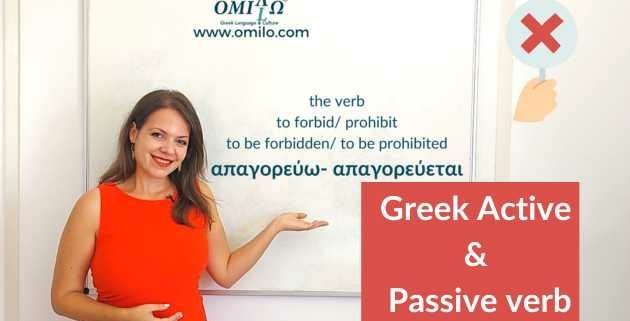How to say “I forbid” or “it is forbidden” in Greek?
Learn the active and passive form of this verb
THIS PART OF GRAMMAR MIGHT BE CONFUSING, AND NEEDS SOME PRACTICE.
But do not worry, siga-siga!
When you learn Greek, a difficult part in grammar is the use of active and passive verbs.
Most students get confused, since it is not something you learn in other European languages.
So here below, we will explain the verb “to forbid” in its active form, as well as “it is forbidden” in the passive form.
If you prefer to watch and listen to the video first, then click here
THE ACTIVE FORM OF THE VERB “I forbid”
- απαγορεύω = I forbid, I prohibit
The conjugation of the active form is exactly like other verbs, such as
πίνω – to drink,
μένω – to live,
δουλέυω – to work,
καταλαβαίνω – to understand Click here to learn the verb ‘to understand’
THE CONJUGATION IS AS FOLLOWS;
Εγώ απαγορεύ-ω
Εσύ απαγορεύ-εις
Αυτός,ή απαγορεύ-ει
Εμείς απαγορεύ-ουμε
Εσείς απαγορεύ-ετε
Αυτοί,ές,ά απαγορεύ-ουν
for example
- Ο δάσκαλος απαγορεύει τα κινητά στο μάθημα. (The teacher prohibits cell phones in class.)
- Ο νόμος απαγορεύει το κάπνισμα σε κλειστούς χώρους. (The law prohibits smoking indoors.)
- Ο γιατρός απαγορεύει στον Νίκο το αλκοόλ. (The doctor forbids Nikos to drink alcohol.)
WE CALL THIS THE ACTIVE FORM, BECAUSE the teacher, the law and the doctor ACTUALLY DO THE ACTION….
THIS MEANS…the teacher prohibits cell phones…, the law prohibits smoking, the doctor forbids me to drink alcohol.
———————————————————————
THE PASSIVE FORM
NOW WE CAN ALSO turn THIS VERB in the PASSIVE voice, BY CHANGING THE conjugation at the end of the verb.
Passive means you are now saying that “something is forbidden”,
Active voice Passive Voice
απαγορεύ-ω (to forbid,prohibit) απαγορεύ-ομαι (to be forbidden,prohibited)
So you keep the same stem, but you change the ending
Keep in mind that we only use the third person (in singular and plural, but the most common by far is the third person in singular)
Εγώ –
Εσύ –
Αυτός,ή,ό απαγορεύ-εται
Εμείς –
Εσείς –
Αυτοί,ές,ά απαγορεύ-ονται
Let’s now see some examples again.
1.
Active voice:
- Ο δάσκαλος απαγορεύει τα κινητά στο μάθημα. (The teacher prohibits cell phones in class.)
Passive voice:
Τα κινητά απαγορεύονται στο μάθημα (από τον δάσκαλο). (Cell phones are prohibited in class (by the teacher).)
2.
Active voice:
- Ο νόμος απαγορεύει το κάπνισμα σε κλειστούς χώρους. (The law prohibits smoking indoors.)
Passive voice:
Το κάπνισμα σε κλειστούς χώρους απαγορεύεται (από τον νόμο). (Smoking indoors is prohibited (by law).)
3.
Active voice:
- Ο γιατρός απαγορεύει το αλκοόλ στον Νίκο. (The doctor forbids Nikos to drink alcohol.)
Passive Voice:
Το αλκοόλ απαγορεύεται στον Νίκο (από τον γιατρό)
Alcohol is forbidden to Nikos. (by the doctor)
Take a look at the video with teacher Myrto and listen to the correct pronunciation of the conjugations and sentences.
Common expressions with “απαγορεύεται».
When being in Greece, you will hear and see these expressions very often.
Απαγορεύεται η είσοδος. (Entry is prohibited.)
Απαγορεύεται το πάρκινγκ/ η στάθμευση. (Parking is prohibited.)
Απαγορεύονται οι φωτογραφίες και τα βίντεο. (Photos and videos are prohibited.)
Απαγορεύεται το κολύμπι/ η κολύμβηση. (Swimming is prohibited.)
Απαγορεύεται το ψάρεμα. (Fishing is prohibited.)
Απαγορεύεται το κυνήγι. (Hunting is prohibited.)
Απαγορεύεται το ελεύθερο κάμπινγκ. (Free camping is prohibited.)
Last but not least, “απαγορεύεται» is also combined with να + verb”.
For example
–Απαγορεύεται να πετάτε σκουπίδια στον δρόμο. (Throwing garbage on the street is prohibited.)
-Στο αεροπλάνο απαγορεύεται να έχετε υγρά πάνω από 100 ml. (It is forbidden to have liquids over 100 ml on the plane.)
———————————————————————
More examples and verbs
Did you like this lesson?
If you want to have one more example with the Active and Passive voice, then click here for the blog article with other verb
Active voice –> Passive Voice – Πλέν-ω (I wash) –> πλέν-ομαι = TO BE WASHED
+++++++++++++++++++++++++++
++++++++++++++++++++++++++++++++++++++++









